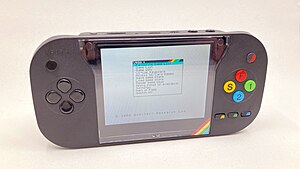ZX Spectrum Vega+
Jump to navigation
Jump to search
| This article was copied (instead of imported) from the now-deleted Crappy Games Wiki. |
The ZX Spectrum Vega+ is a handheld game console based on the ZX Spectrum and designed by Rick Dickinson as a follow-up to the ZX Spectrum Vega handheld TV game which was released in 2015. Only a small number of Vega+ machines were released, before Retro Computers (who manufactured the devices) was wound up.
Why It Flopped
- False advertising: It claimed to have 1,000 games but comes with only 14 games. This was because by the time the system was released, they had lost the rights to most of them.
- The games aren't even mapped correctly and some of them don't even boot up.
- Many things such as the TV port and the SD card slot don't work properly.
- The back of the handheld console has sharp edges. In fact, the edges are so sharp that Larry Bundy Jr. even showed that the back was capable of cutting paper.
- It didn't even come with a charging cable, so people had to use their own or buy one separately.
- Poor build quality.
- The company treated their backers poorly:
- Due to the company's mismanagement, they forced their backers to register themselves as creditors and dragged the production line on and on.
- A lawsuit was even brought up to the company by one of the backers, which unsurprisingly won in favor of the backers.
- It was the final nail to the coffin for Retro Computers as they have permanently closed their doors after the console flopped.
Comments
Loading comments...
[[]]
